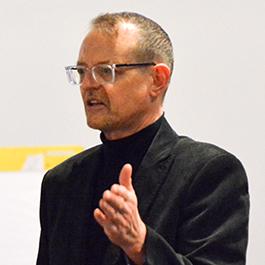Robert Edgell, SUNY Polytechnic Institute – Listening to Outer Space
 What are people saying about space?
What are people saying about space?
Robert Edgell, professor of technology management at SUNY Polytechnic Institute, listens in to the discussion.
Dr. Edgell is currently a Professor of Technology Management and Co-Director of the Joint Center for Creativity, Design, and Venturing at SUNY Polytechnic Institute. He directs Innovation Challenge New York (ICNY), an integrated community-based experiential learning, research, and service program and has been a recipient of the Chancellor’s Award for Excellence in Teaching. He has been a Visiting Professor at the Swiss Business School in Zurich and has delivered research papers and lectures at Stanford University’s Law School, the University of California San Francisco’s School of Dentistry, the California College of the Arts, and the University of St. Gallen. Previously, he was an Assistant Professor at American University’s Kogod School of Business where he was named Outstanding Faculty. Also, he has taught at San Francisco State University’s College of Business.
Dr. Edgell has served in various leadership capacities as a department chair, interim dean, and on several committees. He was a former board member of the Cyber Security Institute at Griffiss Institute and currently serves as a board member of Sculpture Space. He has presented his scholarship, reviewed papers, and chaired sessions at the Academy of Management, the International Atlantic Economics Society, and the Association of American Colleges & Universities among others. His scholarship agenda expands upon his deep commitment to exploring the intersections among economics, human behavior, the humanities, art, and design. He currently researches institutional change processes, design culture, and entrepreneurial capacity development for outer space. His grant portfolio includes a prestigious $100,000 National Endowment for the Humanities (NEH) Humanities Connections grant, a $40,000 SUNY System Performance Improvement Funds, and a $25,000 NYSTEC donation for supporting his entrepreneurial Initiatives and related research. He has been recognized as a “Campus Connector” by Upstate Venture Ecosystems and has earned the Social Sciences Research Network (SSRN) top 10% of Authors designation based on total new downloads.
Dr. Edgell received his PhD in international multicultural management (magna cum laude) from the University of St. Gallen in Switzerland. He holds an MBA from Columbia University Business School in the City of New York and a five-year Bachelor of Architecture from Kent State University, College of Architecture and Environmental Design. Through Columbia’s Chazen Institute of International Business, he studied at Erasmus University, Rotterdam School of Management in The Netherlands. He is a registered Architect and has studied at Harvard University, Graduate School of Design.
Listening to Outer Space
The ongoing institutionalization of outer space has recently intensified amid mounting concerns about Earth’s sustainability and expanding populations. This shift to a space economy, like all major social transformations, is occurring through discursive practices such as debates and discussions. It is important to metaphorically “listen” in search of the most prevalent conversation topics since they yield insights into the direction and challenges of change.
We investigated a literature corpus of nearly 900 relevant documents to better understand the discursive topics.
And what have we “heard” about space?
We identified eight primary topics: Commercial activity and entrepreneurship; human health, safety, and welfare; human settlements; institutional and legal issues; non-earth life; scientific research; strategic vision; and technology.
It was no surprise that “strategic vision” was clearly the most dominant. It refers to the planning and prognostication for human engagement with outer space. In this debate about resource allocation, one side proposes that we should first build a space infrastructure in Earth’s orbit and on the Moon to scaffold human ventures. The other side posits that we should put all efforts into directly settling distant Mars without scaffolding. Yet other voices suggest that the nearby Venus might be best.
For now, these voices are discordant and dissonant. But soon this may change. We will keep listening. Perhaps you should too.



What was the science fiction of my youth is now the discordant discussion of scientists, futurists, governments, and make-it-happen billionaires. At this time, it’s all BS (Brain Storming) that, sooner than later, must coalesce into the coordinated efforts of all players in the Future Game.